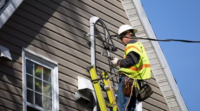Post-tropical storm Fiona may be in the rear-view mirror but it’s still on the front burner for Nova Scotia Power. The company is stuck with a $24.6-million bill that it says is threatening its profits. This week Nova Scotia Power asked regulators for permission to collect $24.6 million in Fiona-related operating costs — like meals, travel and overtime — from ratepayers over an unspecified period of time. It is the first time the company has asked the Nova Scotia Utility and Review Board (UARB) to defer so-called operating, maintenance and…
Read MoreAuthor: mdbincbi
Posthaste: The Canadian dollar is getting hammered — and its future looks even bleaker | Financial Post
So what’s up with the Canadian dollar? While many thought the currency would strengthen in 2023, the loonie has slid to depths not seen since the height of the pandemic. (This morning it was trading near a 6-month low of 72.43 US cents) A big part of this mystery is that the drivers of the currency have changed. When a hawkish Bank of Canada was raising interest rates it supported the loonie, but now that the slowing economy has reduced the risk of more hikes, new drivers are taking over.…
Read MoreWindows 11’s huge 2023 Update is available now: Here’s what’s new | PCWorld
Mere days after Microsoft released the Moment 4 Update for Windows 11 users, adding numerous new features and improvements to Windows 11 version 22H2, the company also unleashed the huge annual Windows 11 2023 Update (also known as Windows 11 version 23H2). “Because Windows 11, version 23H2 shares the same code base and servicing branch as Windows 11, version 22H2, this feature update will be delivered via Windows Update (as with the monthly update process) to enable a quick installation,” Microsoft explains. Read full story here: Windows 11’s huge 2023…
Read MoreWhy A Few Bad Quarters Won’t Spell Doom For The Electric Car Revolution | InsideEVs
If you went into 2023 thinking this year would mark the permanent rise of electric vehicles along some perfect, up-and-to-the-right growth curve, a gloomy tide of recent news may have you wondered how and when, exactly, you ended up in the Twilight Zone. In just the past few weeks, General Motors had a disastrous Q3 earnings call where it abandoned its goal of building 400,000 EVs by mid-2024, announced a delay of more electric models and even hit pause on a new battery plant. Read full story here: Why A…
Read MoreWhat the evolution of our own brains can tell us about the future of AI | engadget
The explosive growth in artificial intelligence in recent years — crowned with the meteoric rise of generative AI chatbots like ChatGPT — has seen the technology take on many tasks that, formerly, only human minds could handle. But despite their increasingly capable linguistic computations, these machine learning systems remain surprisingly inept at making the sorts of cognitive leaps and logical deductions that even the average teenager can consistently get right. Read full story here: What the evolution of our own brains can tell us about the future of AI |…
Read MorePolice in Canada look into tech that accesses your home security cameras | CBC News
An officer looks at a screen showing a network of security cameras from people’s homes and businesses around the city, which can be watched all at once, in real-time. They access areas from which emergency calls come in, or scenes of crimes. That’s how policing is done in some U.S. cities — and police forces in Canadian cities are looking into it. “We foresee a progression for the Hamilton police to incorporate this technology in the future, however there are currently no timelines for implementing this,” Jackie Penman, a spokesperson…
Read MoreHow an award-winning Halifax professor nurtured a network of battery entrepreneurs | CBC News
They call themselves the “Dahn lab” graduates, and they’re powering an unlikely, Halifax-based research hub for batteries designed to replace fossil fuels. At the tightly wired network’s heart is Jeff Dahn, a professor of chemistry and physics at Dalhousie University, who on Oct. 9 was presented with the Olin Palladium Award from the Electrochemical Society for a lifetime of working to improve rechargeable batteries. The prestigious prize has previously been won by Nobel laureates. According to the award citation, the 66-year-old researcher is an author or co-author of 78 inventions…
Read MoreMore than 1.3M Canadians left emergency rooms without being seen in 2022-2023: new data | CTV News
New data obtained by CTV News shows that the number of Canadians leaving hospital emergency rooms without being seen is even higher than we initially reported earlier this month. CTV News requested updated information for the 2022-2023 year, which was not detailed in the most recent Canadian for Health Information (CIHI) report. CIHI staff were able to disclose new numbers, that over 1.3 million Canadians left the ER, after registering for care in the 12-month period between April 1, 2022 and March 30, 2023. This is a 34 per cent…
Read MoreWe caught technicians at Best Buy, Mobile Klinik, Canada Computers and others snooping on our personal devices | CBC News
Marketplace investigation recorded technicians peeping on personal photos, browser history When you need to drop off your tech devices for a repair, how confident are you that they won’t be snooped on? CBC’s Marketplace took smartphones and laptops to repair stores across Ontario — including large chains Best Buy and Mobile Klinik — and found that in more than half of the documented cases, technicians accessed intimate photos and private information not relevant to the repair. Marketplace dropped off devices at 20 stores, ranging from small independent shops to medium-sized chains to larger…
Read MoreDarknet markets generate millions in revenue selling stolen personal data | Ars Technica
It is common to hear news reports about large data breaches, but what happens once your personal data is stolen? Our research shows that, like most legal commodities, stolen data products flow through a supply chain consisting of producers, wholesalers, and consumers. But this supply chain involves the interconnection of multiple criminal organizations operating in illicit underground marketplaces. The stolen data supply chain begins with producers—hackers who exploit vulnerable systems and steal sensitive information such as credit card numbers, bank account information, and Social Security numbers. Read full story here:…
Read More









